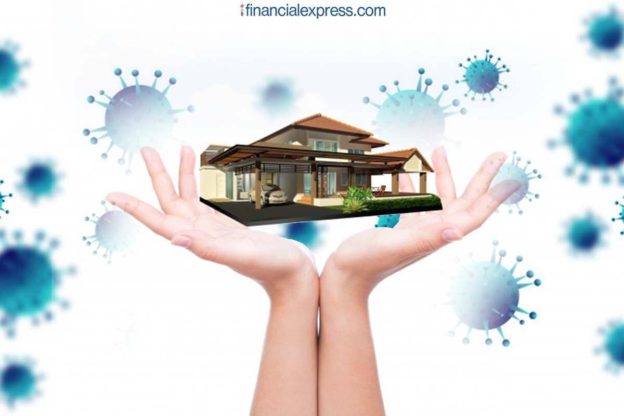It’s not just the home buyer sentiments that have changed, real estate developers are keeping up with the changing needs of the buyers too.
Given the WFH norms, people are spending more time with their families than ever before, rather than spending just the time between 9 PM to 8 AM at home.
On a bright sunny day, Sunil is headed home from a quick grocery run. Lost in thoughts, he is walking towards his rental apartment thinking about how he has been working from home for over 15 months now. His company has institutionalized WFH, and working from the office seems unlikely in the foreseeable future.
As he approached the entrance of his building, he realized that the security guard is nowhere to be seen and people are moving in and out of the building of their own accord. He sighs at the absence of screening protocols in his apartment building. He chooses to take the stairs instead of the lift, thinking to himself if it is time to invest in a new house or property.
This sounds familiar, doesn’t it? The post-COVID world has witnessed a definitive shift in homebuyer behavior. Facilitated by low interest rates, enhanced affordability, a much realistic pricing model and fuelled by the need for a safe haven, there is a rise in demand for ready-to-move-in apartments from corporate and institutional developers.
The deciding factors while purchasing property have also changed. Buyers are now more focused on safer indoor environments, with a renewed emphasis on health, safety and wellness. The preference is tipping towards sprawling societies, self-sufficient with ample open spaces, featuring wider corridors, functioning business centres and contactless pathways.
Back home, Sunil is sipping on his cup of tea, staring out of the window, wishing his apartment had some sort of a roof deck where he could read his morning newspaper while enjoying his tea in peace. And he decided to schedule a tour of the property that he has been eyeing. ‘It’s time’, he said to himself!
Given the WFH norms, people are spending more time with their families than ever before, rather than spending just the time between 9 PM to 8 AM at home. This has made bigger, well-planned apartment spaces with better interiors and a dedicated study space a necessity. It also led to the realization that indoor greenery is as important as trees and shrubbery in the vicinity of your home.
As Sunil entered the gated society to have a tour of what could be his new home, the security guards screened his body temperature and oxygen levels and contactless entry systems. He is impressed by the spacious lobby that has sanitizer dispensers installed at multiple points but what struck him the most was the wide staircases and the multiple touchless lifts the apartment building featured. He is also impressed by the fact that once ready the building will use robotic cleaning machines that can detect, sanitize and clean. He also notices provisions for charging of electric vehicles.
It’s not just the home buyer sentiments that have changed, real estate developers are keeping up with the changing needs of the buyers too. There is an increased focus on filtering out and destroying bacteria by using anti-microbial materials for construction. Consistent efforts are being taken for making the common areas safer by incorporating as many contactless features as possible. New residential buildings will have better sustainability features around water, waste and energy management.
A gymnasium or a fitness club is not just a fancy facility anymore. Improved wellness standards that nurture the physical, as well as emotional aspects of life, have become a necessity. Creating safer, cleaner, and healthier living spaces for homeowners is the top priority. The home buying process has also been streamlined with VR walkthroughs that minimize human interactions.
There is also focus on improving the telecom connectivity that caters to WFH scenarios and developing smart homes with home automation technology. Yes, your home is evolving and transforming with you.
As soon as Sunil stepped into the sample flat, he felt a sense of serenity wash over him. Huge ceiling to floor windows, an outdoor terrace that overlooks the pool – this living room looked like something straight out of a magazine.
He was pleasantly surprised to learn about the touchless doors, showers and sanitary fittings in the bathroom operating on state-of-the-art sensor-activated technology. A seemingly small change that can have a rather huge impact on the day-to-day lives of individuals sharing the home space.
The house was well lit naturally and sufficiently airy with a floor plan that allows for wide, open areas scattered all over and landscaped windows and balcony. This home was everything that Sunil needed it to be, and then some more. All he needs now is to finalize the space for his family and build a home amidst the concrete structure.
The worldwide COVID-19 pandemic has given ‘home’ a whole new meaning. Having a property that you can call your own and fall back on during tumultuous times like these has resonated with several aspiring young home buyers. The home has become a place of safety. Given the travel restrictions, there has also been a steady rise in the demand for second homes in the outskirts – essentially vacation or weekend homes, away from the hustle and bustle of the city. Plot sales have also gone up as the requirements for small, sustainable homes with kitchen gardens have grown.
Today, everyone is looking to elevate their standard of living and by upgrading from a 1BHK to 1.5BHK or to a 2BHK and from 2 BHK to a 2.5 BHK or to a 3BHK and so on. After all, at the end of the day, the space you occupy for 24 hours every day, should feel like a sanctuary, right?
https://www.financialexpress.com/money/how-homebuyer-needs-and-preferences-are-changing-in-covid-times/2268826/







